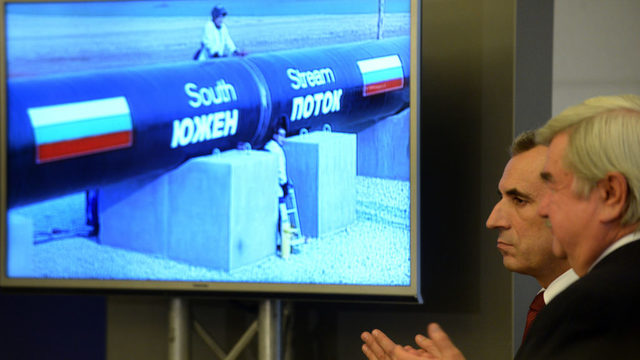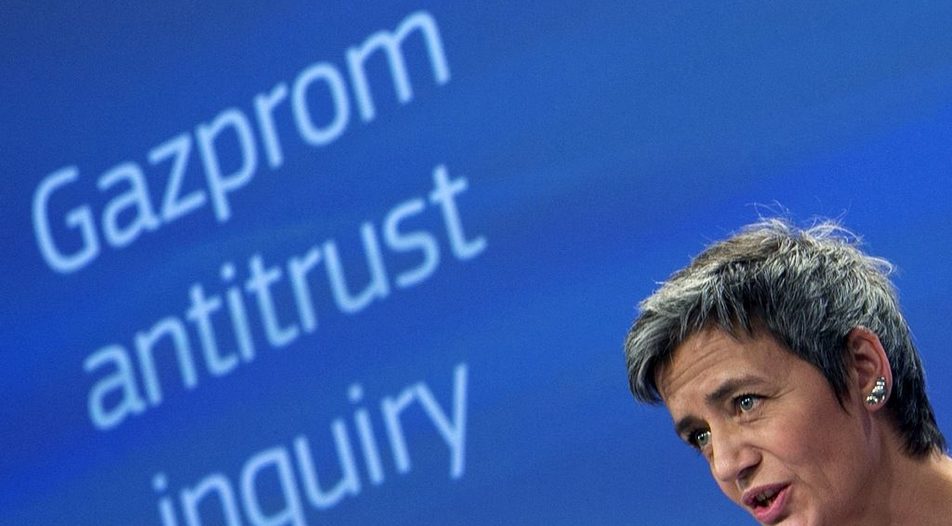Until recently, Bulgarian attempts to restart the South Stream gas pipeline project in a curtailed form were a kind of political posturing, but in recent weeks the plan has begun taking shape. At the end of May Bulgaria negotiated with Gazprom a road map for the development of the Bulgarian gas pipeline grid. The official announcements did not specify why the Russian company needs such an agreement with the Bulgarian authorities, but it is obvious that a new pipeline project is being conceived.
The news is important, not only because it signals the next step of Gazprom's efforts to bypass Ukraine in gas deliveries to Europe. More importantly, it shows that the recent more conciliatory stance of the European Commission on Nord Stream II, a gas pipeline project connecting Russia and Germany across the Baltic Sea, was not missed by the Bulgarian and the Russian authorities. Next, by accepting some pretty vague and weak commitments from Gazprom in order to stop its anti-trust investigation against the Russian company, the European Commission incentivized countries to go alone in sorting out their relations with the Russian company.
South Stream II
South Stream, the gigantic gas pipeline that was intended to bypass Ukraine and bring Russian gas to the Central European markets via the Black Sea and Bulgaria, was terminated at the end of 2014. Russian President Vladimir Putin accused Bulgaria of cowardly following external orders and declared that the pipeline will go to Turkey instead. The Turkish Stream project will not only change the direction of gas flows, but will also deprive Bulgaria of its status of a transit country. The revengeful act followed Sofia's refusal to build the Bulgarian segment of South Stream in violation of EU rules.

Since then the Bulgarian authorities have been trying to resurrect the project in one form or another, hoping to preserve the gas transit revenues. Shipments of Russian gas to Turkey and Greece bring around 100 mn euro in annual revenues for the Bulgarian pipeline operator Bulgartransgaz. After relations between Turkey and Russia worsened at the end of 2015, Bulgaria unofficially claimed that Turkish Stream was impossible and the only route a future gas pipeline could take in the region was via Bulgaria again. Sofia proposed to create a gas hub in Bulgaria with the idea to win the approval of the European Commission for the new pipeline plans.
But the tension between Moscow and Ankara didn't last long and the Turkish Stream construction officially began in 2017.
There are two options for a new pipeline project in Bulgaria. One is a new pipeline across the Black Sea which is the option preferred by the Bulgarian authorities. It will follow the route of the abandoned South Stream, but will deliver significantly lower amounts of gas than the original project, because the gas deliveries to Turkey will go via Turkish Stream. It would mimic the Nord Stream II and will follow the EU's rules on the Bulgarian territory.
Bulgarian Prime Minister Boyko Borissov directly spoke about such a scenario. However, it is not clear whether this is just a wish or an option that is being actively negotiated. Gazprom's number one person for foreign projects, Alexander Medvedev, was not very positive, while the resumption of negotiations with Serbia and Hungary on South Stream (reported by Russian state-sponsored media Sputnik) might concern only the land part of the original project, not its sea segment.
The second option is for an extension of Turkish Stream from Turkish territory to the existing transit pipelines in Bulgaria. This means that Turkish Stream will have bigger capacity to meet not only Turkish needs but also the needs of other countries.
The Bulgarian authorities are trying to argue that changing Ukraine for Turkey as a major gas transit country is not a wise move for Gazprom. But the argument is not aggressively pushed, because Sofia doesn't want to spoil its relations with Turkey and wants some kind of a transit agreement with the Russian gas company.
In both scenarios the Russian gas will be intended for the markets of Hungary, Serbia, Macedonia and possibly Greece. Gazprom actually has interest in a new arrangement with Bulgaria since it has a firm transit agreement with Bulgaria until 2030 and if it ceases the shipments, Bulgaria could reasonably claim 1 billion euro in damages. The new pipeline will solve this issue.
EU is too mild with Gazprom
Bulgaria has tried to negotiate the restart of South Stream since the beginning of 2015, but until recently Gazprom looked with disdain to those efforts. Now things are changing in EU context which makes Gazprom more willing to listen.
It is obvious that the European Commission is bowing to some extent to the Russian gas company. The Commission's Directorate-General for Competition started an anti-trust investigation in 2015 and most experts believed that it will assume a very tough approach towards Gazprom. Now, it seems, the Commission's sweeping investigation into Gazprom's marketing practices in Eastern Europe will end amicably instead of resulting in a major fine. Most of what the Russian company proposes in its commitments (which, if accepted, will put an end to the investigation) is already in place. The important parts of Gazprom's proposal - the possibility to buy gas from different delivery points (i.e. swaps) is very tightly controlled by Gazprom (i.e. Polish PGING selling some of its Gazprom-supplied gas to Bulgaria or Estonia). And the proposal actually helps keeping the status quo.
Before looking for a new supplier, gas companies from the East European countries will first try to find a better priced Russian gas. Basically, the Russian company could allow some freedom every time it needs to deter a possible competitor. But if there is none, it has no incentives to allow swap deals.
In return, the European Commission approved Gazprom's use of almost the whole capacity of Gazprom-owned Opal pipeline in Germany (now blocked again after a Polish intervention). To do that, it used some very broad reading of the EU legislation which requires the owner of the infrastructure to reserve at least 50% of its capacity for other companies. Now it is giving mixed signals about Nord Stream II.
A few years ago, in order to prevent the construction of South Stream, the European Commission held the opinion that "the EU law applies to any infrastructure under EU jurisdiction, this includes Bulgarian territorial waters and Bulgarian exclusive economic zones". Now Energy Commissioner Miguel Arias Canete says that the sea part of Nord Stream "requires a specific legal framework that derive from the European law", i.e. the Third Energy Package will not be fully applied to Nord Stream II. This is explained by "change of the opinion of the Commission's legal service".
At the same time, Competition Commissioner Margarethe Vestager repeatedly said that Nord Stream II is not a project of common interest. Then the European Commission requested from the member states a negotiating mandate to hold talks on Nord Stream II with Gazprom. The last move was negatively met by the Nord Stream II representatives.
If the European Commission is unable to rein in Gazprom, member states like Bulgaria will naturally follow their own strategies. It is true that the suspected price overcharging, which is at the core of the demands for financial penalties put forward by Poland and other countries, is very difficult to prove, but the EU certainly needs firmer commitments from Gazprom. Even though most countries decided to pursue their own approach in their response to the Gazprom commitments, they all want more stringent rules and more concessions from the Russian company. Bulgaria, which assumed the gentlest approach towards Gazprom, basically has the same demands as Poland (minus the financial penalties).
With the apparent satisfaction of the European Commission with the Gazprom commitments, the Bulgarian gas companies were not very demanding in the European Commission's market test of Gazprom proposals. They know that the anti-monopoly investigation will not bring much change to Gazprom's behavior and prefer to prepare the ground for separate deals.
Until recently, Bulgarian attempts to restart the South Stream gas pipeline project in a curtailed form were a kind of political posturing, but in recent weeks the plan has begun taking shape. At the end of May Bulgaria negotiated with Gazprom a road map for the development of the Bulgarian gas pipeline grid. The official announcements did not specify why the Russian company needs such an agreement with the Bulgarian authorities, but it is obvious that a new pipeline project is being conceived.
The news is important, not only because it signals the next step of Gazprom's efforts to bypass Ukraine in gas deliveries to Europe. More importantly, it shows that the recent more conciliatory stance of the European Commission on Nord Stream II, a gas pipeline project connecting Russia and Germany across the Baltic Sea, was not missed by the Bulgarian and the Russian authorities. Next, by accepting some pretty vague and weak commitments from Gazprom in order to stop its anti-trust investigation against the Russian company, the European Commission incentivized countries to go alone in sorting out their relations with the Russian company.












